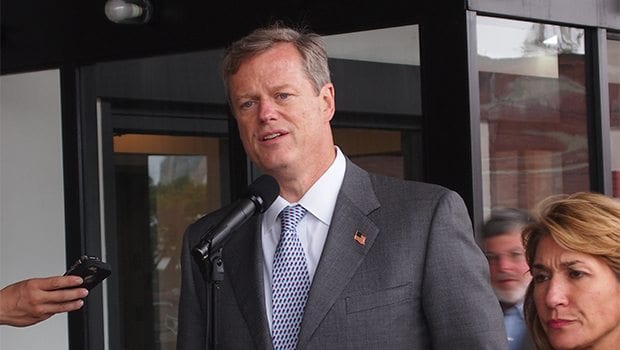
Charlie Baker has made welfare reform a cornerstone of his campaign, a move that risks alienating blacks and women, two voting blocs he needs to defeat Attorney General Martha Coakley in the race for governor.
However, the anti-fraud rhetoric outlined in recent pro-Baker television ads, some critics believe, overstates the problem by painting public benefits as a drain on the state budget. The ads, paid for by the Commonwealth Future Independent Expenditure Political Action Committee, seem to be at odds with Baker’s own talking points on welfare.
One-on-one, the self-described “data geek” says his emphasis is on helping people find pathways to work, ending the cycle of dependency on government subsidies.
“I do think we should provide supports—child care, GEDs—we ought to provide people with mechanisms to find their way to self-sufficiency,” he said in a wide-ranging interview with the Banner. “I think that’s a good thing. I’ve talked to a lot of people on public assistance who say you’re either all in or all out.”
His proposed reforms, listed on his campaign web page, include reductions in the extensions recipients can use while in school or job trainings and increased funding for child care vouchers to help parents return to work.
“The proposals we’re talking about are designed to help people get a GED, find a way to work and work their way to self-sufficiency,” he says.
With the increase in the minimum wage and the earned income tax credit, Baker says people working to get off of public benefits have opportunities to move forward and become self-sufficient without falling behind the standard of living they enjoyed while receiving benefits.
“Maybe we can talk to the feds about doing something about the way Section 8 works,” Baker says. “I have to believe there’s a way to create a path, here, where people can see their way to a set of steps that doesn’t require them to move back to move forward.”
In addition to his own welfare reforms, Baker has also spoken in support of an initiative by Worcester Housing Authority Director Raymond Mariano, which would require residents of city-owned public housing to work in order to remain in public housing.
“I would argue that what he has proposed is a pretty thoughtful way of trying to get folks to take the first step,” he said.
Baker did not address the issue of welfare fraud raised by the Commonwealth PAC’s television ad, other than to note that it was not his, but when pressed on whether he would examine business tax expenditures, which cost the state $770 million a year, he said he would.
“Anytime anybody defrauds the government, they’re defrauding all of us,” he said. “Whether you’re using the tax code to do that or you’re using a phony shell corporation, or you’re using something else, fraud is fraud.”
Baker is clearly no stranger to issues of tax code and welfare reform, having served as head of Health and Human Services and Administration and Finance under the administrations of past governors William Weld and Paul Cellucci. In those roles, Baker says, he gained insights into state government and the people it serves.
“I’m a data geek, but I’ve never been one of those people who thought that reading a report was enough,” he said. “You always have to spend time, talking to people who are a lot closer to what’s going on, to really get sense of what brings whatever the information is to life.
“When I was at HHS, once a month I had office hours in communities. I’d be at Dimock Community Health Center or Children’s Services of Roxbury. I’d have office hours in the morning, then have lunch with people in the neighborhood, and then office hours in the afternoon, then some sort of drive around in the evening. I never thought you could really understand a job like that one without talking to people directly and hearing from them, what’s on their minds.”
The initiatives he proposes for state government cover multiple areas—increased local aid for Massachusetts cities and towns, funding MBTA system repairs, supporting Main Streets programs, lifting the cap on charter schools.
While Baker has not taken a “no new taxes” pledge, he says it’s possible to fund his initiatives without raising taxes.
“If you add up our entire package, it’s about a $300 to $500 million total,” he said. “If you talk about funding that in the course of a four-year period, and the budget’s $38 billion, four times 38 gets you close to $120 billion in total spending over that time period. State tax revenue goes up by about $1 billion a year.”
Of course, the state’s costs for health care, pensions, energy and other obligations will likely increase along with revenues. And many of the proposals he outlines, including the charter school cap and MBTA funding, have met considerable resistance in the Democrat-controlled state House and Senate.
But Baker says his initiatives are worth trying.
“I’ve always said you can have a list of things you want to do and you can get them all done,” he said. “You just can’t get them all done at once. The proposals that we’ve made are relatively modest, but I believe directionally correct. I’m one of those people who think that one of the things we should do is try stuff, and learn from trying stuff. And if things work, do more of them, and if things don’t work, make adjustments and do things differently.”







